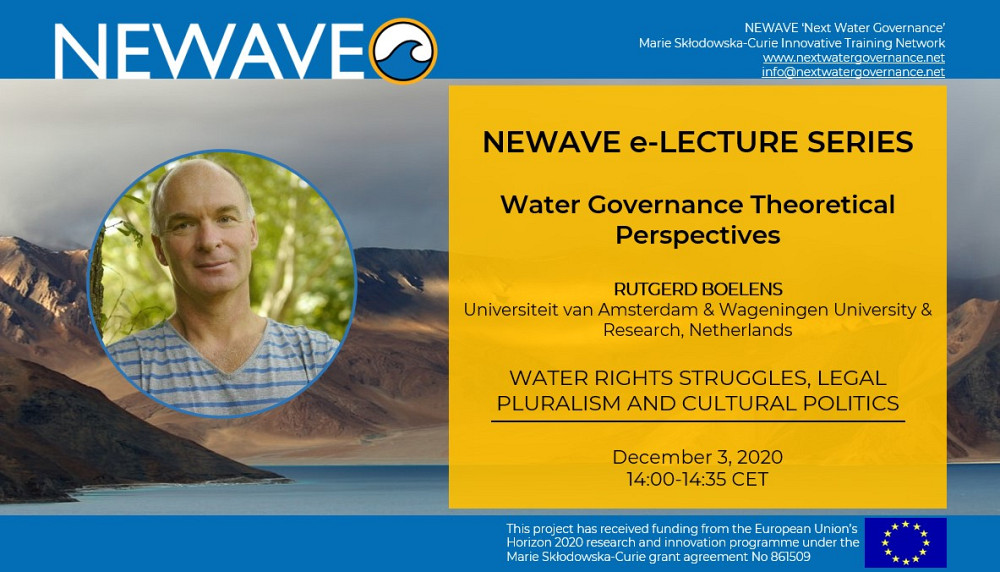NEWAVE e-Lecture Series: Water Rights Struggles, Legal Pluralism and Cultural Politics | Prof. Rutgerd Boelens
Water Rights Struggles, Legal Pluralism and Cultural Politics
Around the world, rather than understanding locally prevailing, hybrid systems of water rights, identities and governance forms, objectivist water science-policy-intervention schemes tend to enhance universalist, civilizing water expert notions. ‘Living’ water rules, rights and organizational forms are commonly dismissed or strategically aligned with dominant water culture. Modernist paternalistic or market-based policies to ‘recognize’ local water cultures harbour subtle politics of codification, confinement and disciplining. Thereby, overlapping ‘governmentalities’ seek to produce ‘hydrosocial order’ - connecting local water practices and worldviews to supralocal schemes of belonging. This lecture discusses how efforts to reorganize hydrosocial territories and order ‘unruly’ water cultures engender policy models that depoliticize their deeply political choices. How they trigger cultural misrecognition, distributive injustice, political exclusion and often unsustainability. But this is not a one-way, dichotomist or deterministic affair. Hydro-territorial politics find expression in encounters of diverse actors with divergent spatial and political-geographical interests. Their territory-building projections and strategies compete, superimpose and align to strengthen specific water-control claims. Thereby, actors continuously recompose the territory’s hydraulic grid, cultural reference frames, and political-economic relationships, generating ‘territorial pluralism’. We discuss how efforts to establish, demystify or transform frames of water order are at the heart of water struggles. Thereby, hydrosocial territorialization is mediated by complex counter-forces and alternative water truths.
References:
Boelens, R. (2014). Cultural politics and the hydrosocial cycle: Water, power and identity in the Andean highlands. Geoforum, 57, 234-247.
Valladares, C., & Boelens, R. (2019). Mining for Mother Earth. Governmentalities, sacred waters and nature’s rights in Ecuador. Geoforum, 100, 68-79.
Boelens, R., Hoogesteger, J., Swyngedouw, E., Vos, J., & Wester, P. (2016). Hydrosocial territories: a political ecology perspective. Water International, 41(1), 1-14.
Ross, A. & H. Chang .(2020). Socio-hydrology with hydrosocial theory: two sides of the same coin?, Hydrological Sciences Journal, 65:9, 1443-1457.
Boelens, R., & Gelles, P. H. (2005). Cultural politics, communal resistance and identity in Andean irrigation development. Bulletin of Latin American Research, 24(3), 311-327.
Dupuits, E. (2019). Water community networks and the appropriation of neoliberal practices: social technology, depoliticization, and resistance. Ecology and Society 24(2):20.
Prof. Rutgerd Boelens
Rutgerd Boelens is Professor of ‘Water Governance and Social Justice’ at Wageningen University, The Netherlands, and Professor ‘Political Ecology of Water in Latin America’ with CEDLA, University of Amsterdam. He also is Visiting Professor at the Catholic University of Peru and the Central University of Ecuador. He held the 2013-2014 Chair ‘Territorial Studies’ with the Mexican Science Foundation and COLSAN. He coordinated the international Water Law and Indigenous Rights alliance WALIR, and several large water governance and environmental justice research programs. Currently he directs the international Justicia Hídrica/Water Justice alliance (www.justiciahidrica.org). His research focuses on political ecology, water rights, legal pluralism, water cultures and cultural politics, governmentality, hydrosocial territories, and social mobilization, mainly in Latin America and Spain.
About the e-Lecture Series:
This online training module has the objective to engage the NEWAVESRs and the audience in different water governance perspectives. All lectures are open to the public upon registration.
Please register here
A participation certificate can be requested if attending at least 80% of the online public talks.
*All times are in CET (UTC+1)
We would love to know what you think! Please leave a comment below and engage in our online discussion group.




